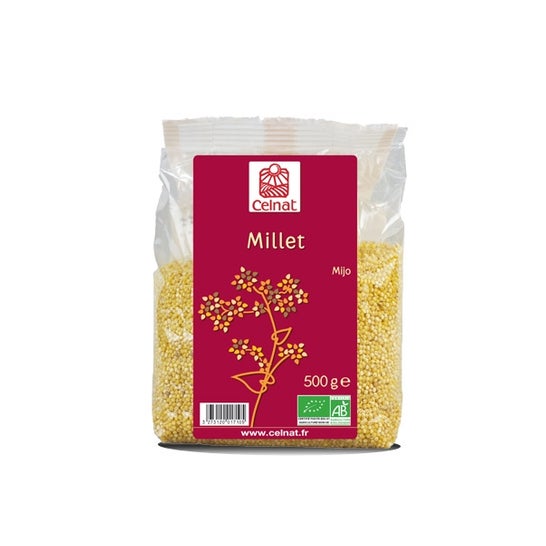It is millet, a cereal that provides nutrients such as iron and magnesium to the body. Indicated as an alternative to pasta or rice, it contains remineralizing properties. Promotes digestion and intestinal transit. Recommended in slimming diets. It is one of the most energetic cereals, with a moderate amount of proteins and few fats.
Celnat Millet Grain 500 g
€2.10 by redeeming Health points. Log in
![]() Sent from Spain
Show details
Sent from Spain
Show details
Enviado por DocMorris
€2.10 by redeeming Health points. Log in
![]() Sent from Spain
Show details
Sent from Spain
Show details
Enviado por DocMorris
Description
Instructions for use
Cook with broth or boiling water for 20 minutes.
Composition
Millet.
Price per 100 G
Pharmaceutical Advice
Iron is a functional mineral that contributes to the body's growth and development. It is present in haemoglobin and myoglobin. These proteins transport oxygen from the lungs to the rest of the organism. Iron is also involved in the creation of hormones and connective tissue.
Our organism absorbs this mineral from foods such as seafood, lean meat, eggs, pulses and nuts. To facilitate its absorption, it is advisable to add acidic foods rich in vitamin C, such as orange or lemon juice, to the diet. A lack of iron in the diet can cause iron deficiency (anaemia). In the long term, it can lead to symptoms such as a constant lack of energy, fatigue, intestinal disorders and/or difficulty keeping body temperature under control. Lack of iron can be restored through a varied diet. If this is not enough, it can be mitigated through supervised supplementation. It is essential to follow the advice of a healthcare professional and always avoid taking an iron dietary supplement without checking if you are deficient in this mineral.
The body's iron requirements will change throughout the years. It is particularly important to regulate it during the years of menstruation, as well as in pregnant women and infants. Iron is also actively involved in development and growth and is therefore very important for newborn babies.
Safety and product information
Safety visual aids
At this time we do not have safety images for this product, but we are working on it. We encourage you to check back later for updates. In the meantime, we recommend that you read the safety information that comes with the product before using it. If you have any questions about safety, please do not hesitate to contact us. Also, if you wish, you can also return the product by following our terms and conditions.
Manufacturer details
At the moment we do not have the manufacturer's details, but we are working to add them as soon as possible. We invite you to check back later for updates. If you have any questions, please do not hesitate to contact us, we will be happy to help you.
RELATED SEARCHES ABOUT Food
New in Nutrition
- Dietmed Skin Piel Cabello Uñas 24 Ampollas
- FontActiv Forte Chocolate 2x800g
- IVB FertiUp Sabor Kiwi 210 g
- Prozis Omega 3-6-9 120caps
- MuscleFit Harina de Avena Sabor Chocolate con Avellanas 1kg
- MuscleFit Harina de Avena Sabor Donuts 1kg
- MuscleFit Harina de Avena Sabor Natillas 1kg
- MuscleFit Harina de Avena Sabor Fresa y Plátano 1kg
- MuscleFit Harina de Avena Sabor Chocolate 1kg
- MuscleFit Harina de Avena Sabor Chocokit 1kg

